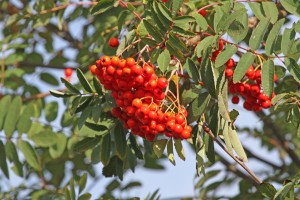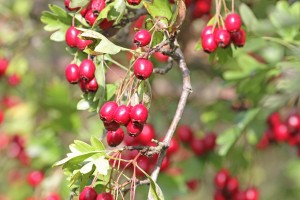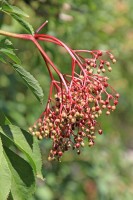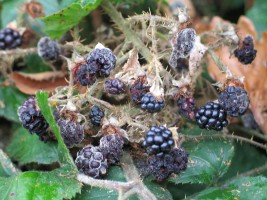The Parrot Society UK
Autumn's Natural Harvest
We are now in that lovely time of year when the children return to school after their long summer holidays, (although I refuse to start thinking about Christmas just yet!) and nature is providing us with its wonderful autumn harvest, towards the end of the growing season. Hedgerows, gardens, and trees are laden with colourful goodies, many of which make suitable, nourishing, free foods for our cage and aviary birds. This bounty seems to have come earlier this year, thanks to the long spell of hot, dry weather.
Gardens or allotments will have provided raspberries and strawberries earlier in the year, and now will yield cultivated blackberries and currants, as well as apples, pears, plums and so on. Vegetables such as squashes, greens, peas and beans, carrots, peppers and maize (sweet-corn) are valuable dietary items, and particularly good sources of vitamin A. Hedgerows and woods offer rowan berries (mountain ash), elderberries, haws from hawthorn (May tree) and rose hips, as well as wild blackberries (brambles). All of these goodies are suitable for feeding to parrots, parakeets and soft bills. Later will come sweet chestnuts and cobnuts (hazel nuts). Then there are many seeding grasses, and other seed-bearing plants like teasel, containing seeds suitable for finches and small parakeets.


Ripe berries of Rowan (Mountain Ash) and Hawthorn
Taking advantage of all this free food in season not only saves you money that you would otherwise spend at the supermarket, but it will also reduce the carbon footprint of purchasing fruits and vegetables that have probably been transported long distances. Not only that, but using foods as they ripen mimics the natural cycle of foraging that birds will do in the wild. They may gorge on one type of fruit or nut when it is in season, but then will move on to the next delicacy as it arrives. An advantage to us is that much of this bounty may be frozen to provide extra treats off-season. These will include currants, most of the berries, and vegetables.

Elderberries
However, there are some words of warning. Beware of over-ripe fruits that have started to go mouldy, since the mould growth is dangerous to birds. Juicy fruits like plums, pears and apples are attractive to wasps, and these insects will at best be a nuisance to our birds, and at worst can kill them through occasional anaphylactic shock resulting from a sting. Do not use fruits from commercial orchards that may have been sprayed with insecticides, and do not use berries from hedgerows close to busy roads, as these may be contaminated by vehicle exhaust fumes.

Mould on blackberries
Many nuts, seeds and berries are not safe to feed to birds. These include conkers (horse chestnut), laburnum, lupin, sweet peas, yew, ivy, holly, privet, nightshade and arum. Lists of plants poisonous to birds are published on this website - Poisons and Toxins. If in doubt, stick to what you know and recognise from the above-mentioned. With these warnings heeded, do not be afraid to try out this natural bounty – your birds will undoubtedly appreciate it!
